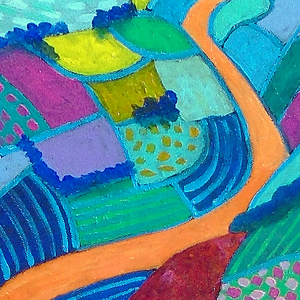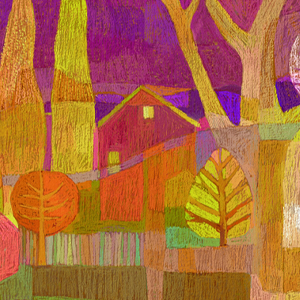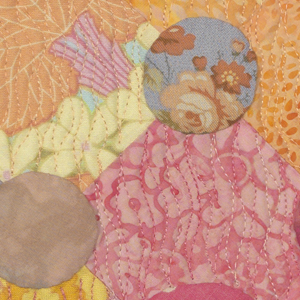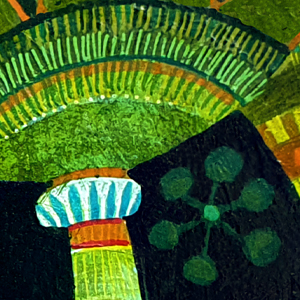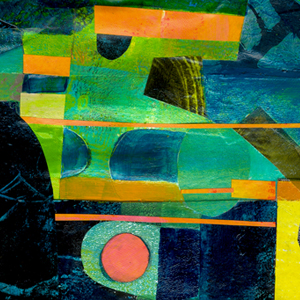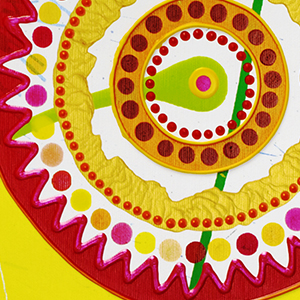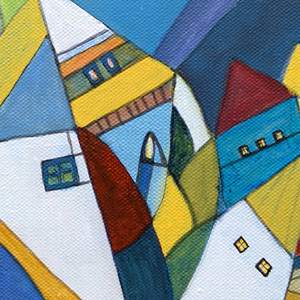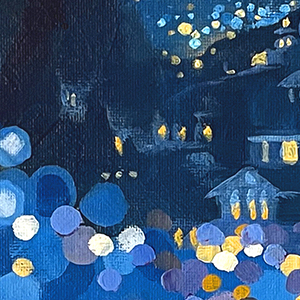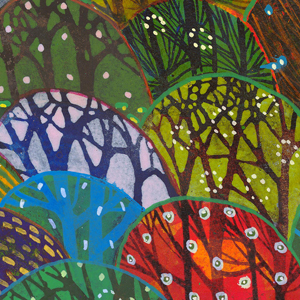
From the Editor
Welcome
Suzanne Shanahan, Editor
Artwork: “Winding Road through Valley of Summer Fields” by Stephen Conroy © 2017
This issue of Virtues & Vocations: Higher Education for Human Flourishing focuses on civic virtue and, more specifically, civility and our ability to summon the courage to act on our convictions in difficult times.
For more than 250 years, higher education has served as an anchor for democracy in the United States. In fall 2022, Wes Siscoe, then a Virtues & Vocations post-doctoral fellow (now assistant professor of philosophy at Bowling Green State University), wrote a compelling essay on civic virtue in higher education. Wary of today’s growing public polarization, Siscoe argues that, “[n]ot only is it part of the mission of higher education to prepare students for democratic citizenship, but as communities that facilitate the exchange of ideas and foster intellectual curiosity, colleges and universities have the chance to do more than simply passing on the required content knowledge.” This “something more,” I would argue, should include modeling and practicing honesty, courage of conviction, and civil dialogue it in and out of the classroom. As with any other virtue, we must create spaces for practice.
Increasingly I wonder whether there is a broader cultural context to the divisive dynamics at play on campuses, in social media, and in our political institutions. I would argue that mistruths and self-censoring are prevalent in ways big and small in our daily lives in many domains. This is not a coded partisan political statement. Nor am I talking about wokeism, however defined. Rather, we often engage in well-meaning and calculated mistruths and self-censoring as a routine part of what it means to live together on and off campuses. Some examples are small: I lie at the Whole Foods checkout when they ask if I found everything I needed. I lie after traipsing into my office in the brutal South Bend cold when colleagues ask if I enjoyed my walk to work. These trivial, almost automatic untruths are almost a form of courtesy to make simple interactions more seamless.
Other untruths are more deliberate. Last fall, I shared with a group of visibly appalled (but otherwise silent) students in class that I lie all the time to my children. More specifically, as a mother of three young women, if they ask, I always tell them they look absolutely beautiful no matter how disheveled or unkempt they may actually look. I lie quite deliberately because I want them to know that beauty is more than an outfit. I lie because I want them to see and understand that their beauty exists in them and entirely with or without my judgment. I don’t for a minute believe this is the best strategy, but it is the one I’ve settled on, or the one that has settled on me.
Untruths are not just part of our daily private discourse. Following a recent and typically rancorous local school board meeting, I found myself wondering how often people really believe the claims they make. Perhaps the presentation I heard was a form of magical thinking: If we tell people often enough that a new curriculum in their failing school will bring the student proficiency rate in math and reading from 20% to 80% in a few short months, maybe it somehow will? Or maybe you say that because you think that is what people need to hear or because you want people to have something to aspire to? Or maybe you say 80% and not 30% when we don’t want to convey the impression that we lack confidence in the abilities of some of our children? Demoralized people often struggle to make significant strides. Here the untruth is a policy strategy.
Truth is hard, and sometimes—as in my lies to my daughters or new school curriculum proposals—noble justifications can make truth seem worth bending for other ends. Unto themselves, small mistruths and censoring may be utterly benign or even a good thing, but it is quite possible they make it much more difficult to be honest, candid, and utterly truthful when the stakes are higher and the questions are harder. They might mean we will struggle even more in contentious circumstances. These recent experiences, public and private, have me pondering: how often do people say things they don’t actually believe or avoid saying things they do believe throughout their day? Why do we routinely utter untruthful or dishonest statements, and have we paused to consider the second-order consequences for our public life of this prosaic, everyday, low-stakes dishonesty?
We need to practice truthfulness/truth-seeking, and higher education creates an ideal space to grapple honestly with issues big and small. Civility requires a certain set of skills, but honest discourse requires still more. And so we not only asked our authors to write on civic discourse but also courage. The broad range of scholars who have written for us reflect varied disciplinary traditions and professions, different institutional contexts, and unique personal experiences. Despite significant variations in emphases and analysis, they share a keen belief that thought and action that is animated by conviction and conveyed with civility is essential to the continued thriving of our educational institutions and our communities.
We are particularly excited about the interlude in this issue. Here we offer brief reflections from six university leaders and public intellectuals grappling with the current challenges and opportunities of civil disagreement and courage of conviction on and off campuses in the United States. They each address both signs of hope and challenges to overcome.
The art for this issue emphasizes the important opportunities for our shared flourishing that emerge when borders and boundaries intersect or overlap. We hope it provides inspiration at a time when civility and conviction often appear at odds.

Suzanne Shanahan is the Leo and Arlene Hawk Executive Director, Institute for Social Concerns, University of Notre Dame.
Spring 2025
Part I: Defining Virtue
James Arthur
Dayna L. Cunningham
Greg Lukianoff
Najeeba Syeed
Interlude: Defining Moments
Part II: Defining Vocation
MORE





